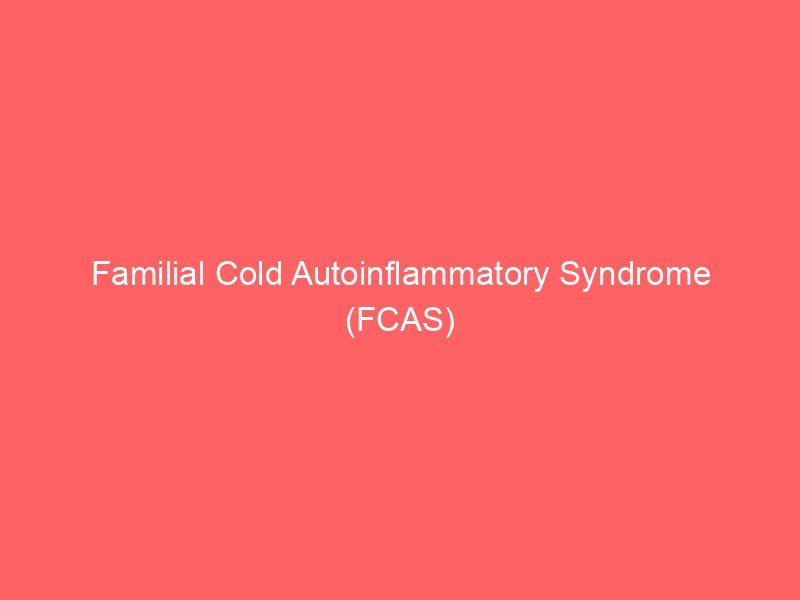
Familial Cold Autoinflammatory Syndrome (FCAS) is a rare genetic condition that affects the immune system. It is characterized by recurrent episodes of fever, skin rash, joint pain, and eye redness triggered by exposure to cold temperatures or stress. These symptoms are caused by an overactive immune response, leading to the production of inflammation-causing substances in the body.
FCAS is caused by mutations in the CIAS1 gene, which provides instructions for making a protein called cryopyrin. Cryopyrin plays a role in regulating the production of cytokines, which are substances that regulate the immune response. In people with FCAS, mutations in the CIAS1 gene lead to an overactive immune response and the production of too many cytokines, causing inflammation.
Causes
FCAS is caused by mutations in the CIAS1 gene, which provides instructions for making a protein called cryopyrin. Cryopyrin is involved in regulating the production of certain pro-inflammatory cytokines, which are signaling molecules that play a key role in the body’s immune response.
When mutations occur in the CIAS1 gene, the resulting malfunctioning cryopyrin protein leads to an overproduction of pro-inflammatory cytokines, causing an uncontrolled, systemic inflammatory response. This response results in the symptoms associated with FCAS, including fever, skin rash, joint pain, and fatigue.
In summary, FCAS is caused by mutations in the CIAS1 gene, which leads to the overproduction of pro-inflammatory cytokines and an uncontrolled inflammatory response, resulting in the symptoms of the disorder.
Symptoms
The main symptoms of FCAS include:
- Recurrent Fever: FCAS patients experience recurrent episodes of high fever that can last up to a week. The fever episodes are not related to any specific viral or bacterial infections.
- Rash: A rash may develop on the skin during a fever episode, which can be red and bumpy or blisters filled with fluid.
- Joint Pain and Swelling: FCAS patients may experience joint pain and swelling, especially in the hands, feet, and knees.
- Headaches: FCAS patients may experience headaches during a fever episode, which can be accompanied by neck stiffness and light sensitivity.
- Fatigue: FCAS patients may feel fatigued and exhausted during and after a fever episode.
- Abdominal Pain: FCAS patients may experience abdominal pain, nausea, and vomiting during a fever episode.
It is important to note that these symptoms may vary from person to person and may not all be present in every individual with FCAS.
Diagnosis
Familial cold autoinflammatory syndrome (FCAS) is a rare genetic disorder that causes recurrent episodes of inflammation and fever, triggered by exposure to cold temperatures.
Diagnosis: The diagnosis of FCAS is based on the following criteria:
- Recurrent episodes of fever, arthritis, skin rash, and conjunctivitis after exposure to cold temperatures
- Normal findings in laboratory tests during the intercritical period
- No response to antibiotics or antiviral medications
- Family history of similar symptoms
Tests:
- Physical examination: The physician will examine the patient for any signs of inflammation, such as redness, swelling, or tenderness in the affected areas.
- Blood tests: Blood tests can help diagnose FCAS by measuring the levels of certain inflammatory markers, such as C-reactive protein (CRP) or erythrocyte sedimentation rate (ESR).
- Genetic testing: Genetic testing can confirm the diagnosis of FCAS by identifying mutations in the NLRP3 gene, which is responsible for encoding the cryopyrin protein.
- Skin biopsy: In some cases, a skin biopsy may be performed to rule out other autoimmune or infectious diseases that can cause similar symptoms.
It is important to note that FCAS is a rare condition and can be easily mistaken for other illnesses, making an accurate diagnosis challenging. A multidisciplinary approach, including a careful medical history, physical examination, and laboratory tests, is crucial in making the correct diagnosis.
Treatment
Familial Cold Autoinflammatory Syndrome (FCAS) is a rare genetic disorder that affects the immune system, causing symptoms such as fever, skin rash, joint pain, and eye swelling. The main treatment for FCAS is nonsteroidal anti-inflammatory drugs (NSAIDs) such as ibuprofen and naproxen, which help reduce the symptoms of the disorder. In more severe cases, corticosteroids, such as prednisone, may also be used to suppress the immune system and reduce inflammation.
In addition to medication, lifestyle changes can also help manage the symptoms of FCAS. These may include avoiding cold temperatures, wearing warm clothing, and engaging in gentle physical activity to help reduce joint pain. It is also important for individuals with FCAS to monitor their symptoms and seek prompt medical attention if they experience a flare-up or if their symptoms become more severe.
It is important to note that FCAS is a chronic condition and that there is currently no cure. Therefore, long-term management of the disorder and close monitoring of symptoms are essential to ensure the best possible outcome for individuals with FCAS.




 Shop From Rxharun..
About Us...
Editorial Board Members..
Developers Team...
Team Rxharun.
Shop From Rxharun..
About Us...
Editorial Board Members..
Developers Team...
Team Rxharun.